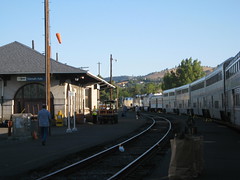CTAA is currently seeking applicants for its 2012 Rural and Tribal Transportation Technical Assistance Program. Through the rural and tribal programs, CTAA offers free hands-on technical assistance to rural communities and tribal organizations. The assistance can help start new transit programs, expand or enhance existing services, or develop facilities.
Projects will stimulate economic development and small business growth. The results of the Maine project, described below, were featured in a New York Times opinion piece, Thinking Outside the Bus.
Typical Project Gets Attention
The following are some typical projects.
Brunswick, Maine-Technical assistance project developed plan for implementation of new transit service in Brunswick, serving local residents and students of Bowdoin College. The Brunswick Explorer service will interface with extension of Amtrak's Downeaster trains to Portland and Boston. The transit service will also serve the multiuse redevelopment of the former Brunswick Naval Air Station site.
According to the New York Times (the primary news source for my extended family):
In the world of public transit, the Brunswick Explorer is a radical idea. Its genesis came from a coalition of local social service agencies — organizations that work with the elderly, mentally ill, disabled, homeless, as well as with college students and local hospitals. They approached Coastal Transit, a nonprofit regional transit provider to be a part of their coalition. Coastal Transit’s executive director, Lee Karker, had worked on two other rural bus systems that fell apart. Both were designed to fill objectives other than helping riders; one was supposed to clear congestion out of a tourist town, and the other just drove from one end of town to the other without much regard for where riders wanted to go. Karker describes the process of setting up the Explorer as “more organic.” “Before when we looked at bus routes we got input on traffic patterns, not input from the users,” he said. “Now we’re trying to be more entrepreneurial.” Working as part of the coalition, rather than as transit engineers, changed their worldview. “We have a tendency to make a transit system look the way we think it should look rather than what the community needs and what they want,” Karker said.[Klamath Falls, Ore., where Amtrak meets local transit.]
Sitka, Alaska- CTAA provided service planning assistance that led to establishment of public transit services operated by the Sitka Tribe of Alaska. Assistance also helped identify facility needs for transit operations and vehicle maintenance.
Rhinelander, Wisconsin- Project enabled community to establish mobility management program to provide coordinated public transit service in three counties.
Eastern Band of Cherokee Indians, North Carolina- Technical assistance helped Cherokee Transit enhance the effectiveness and efficiency of its services, including a park shuttle serving the Great Smoky Mountains National Park. Assistance also helped Cherokee develop plan for new transit facility.
Guidelines
The Programs provide planning assistance only, from CTAA staff and consultants. Although CTAA cannot provide operating or capital funding through the Programs, potential funding sources for implementation will be identified.
Rural projects must be located in communities of less than 50,000 population, and outside designated urbanized areas. Applicants must be for-profit or not-for-profit entities; potential governmental applicants should contact CTAA for further guidance.
Tribal applicants should be federally-recognized tribal entities.
Deadline Approaching
Applications are for long-term projects and are due at CTAA by February 7, 2012. Long-term projects will be selected competitively. CTAA also provides short-term technical assistance; applications can be submitted at any time. For more information contact Charles Rutkowski at 202.299.6593, e-mail at rutkowski@ctaa.org, or visit the website of the Rural and Tribal Transportation Technical Assistance Program.





No comments:
Post a Comment